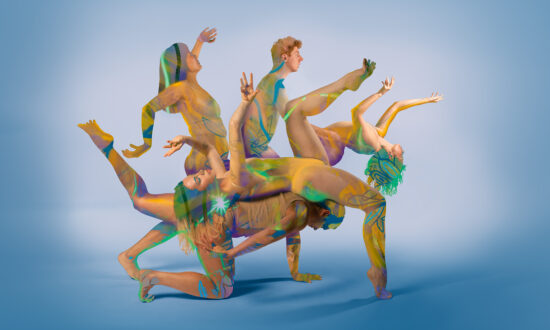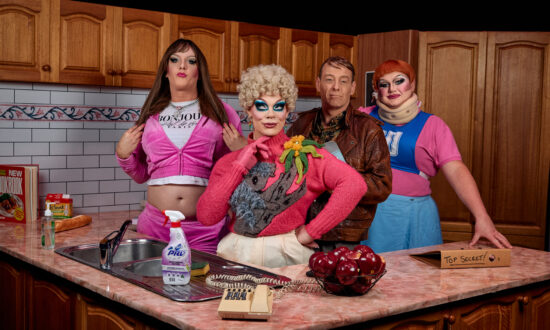It should be called “the theatre of love”. There is something slightly demeaning about the name “amateur theatre”. It seems to imply unskilled, bad. This is just not so.
According to one theatre professional interjecting from the audience at an Adelaide Critics Circle awards ceremony when the critics announced that their awards were going to expand to include non-professional productions, professional theatre is distinguished by “training”.
But theatre as a professional career choice always was and still is perilous. Even for those with years of formal “training”, work is uncertain. Full-time jobs are rare. Actors move from job to job, often having to travel and compete with other actors in auditions for roles. In between, they sugarcoat the embarrassment of unemployment with the ironic term of “resting”.
A lot of it goes on. Maybe one in a thousand “trained” actors finds security in the profession.
The theatre, professional or amateur, is not a world for wimps. It needs powerful egos and those egos need the reinforcement of praise. It also needs a fierce spirit of hope, an ability to cope with rejection and the know-how to live on a shoestring between jobs. Waiting table has been a standby. Look around, you’ll find “resting” actors all over the place.
But all actors have to come from somewhere, to have sipped the nectar of applause, and to have bonded with production teams. That somewhere has invariably been the amateur context, be it school or community shows.
Sometimes, “resting” actors choose to tread the unpaid boards and keep their skills honed.
Perhaps it is time to change the name of amateur theatre to unpaid theatre. There’s a thin line between the two, and quite a bit of ill-founded arts snobbery. Professional theatre grew out of amateur theatre, for heaven’s sake.
Amateur theatre is as old as the human impulse to entertain. One could go back thousands of years and find a form of theatre. Aboriginal corroborees are a form of theatre. So are salon performances.
Our first colonists built theatres and music halls as quickly as they could. Entertainment is a basic human need and a societal lifeblood.
Theatre folk have always been an irrepressible breed. Though many of them masquerade by day as lawyers and architects, nurses and accountants, they all have the same greasepaint in their veins.
Amateur theatre is full of actors who did not have the courage or economic option to go pro. They needed day jobs. Many of them have substantial aptitude and years of experience. Hence, it is quite possible to see amateur theatre productions which are just as good as, or, heaven forfend, maybe even better than some professional shows. Never presume. Arts snobs miss out on a lot.

An autographed photo of a 1960 Adelaide amateur theatre production of The One Day of the Year, featuring Tony Ogier, Terence Stapleton (who later had a successful professional acting career on stage and screen), Francis Flanagan and Patsy Flanagan.
We in Adelaide are spoiled for choice of non-pro theatre, and those struggling with the cost of tickets to the big pro shows can get a bang for their buck at a non-pro show. For one thing, they still mount stage spectacles out there in the burbs.
While shrinking arts budgets have forced professional companies to trim down their casts, amateur theatre – which does not depend on grants and has always had to rely on volunteers – still manages with collaborative oomph to present big shows with big, busy casts.
It also turns on solid, classic, popular works – the sort of theatre that everyone should see at least once: plays by the likes of Wilde, Sheridan, Shakespeare, Marlowe, Stoppard, Brecht, Simon, Bennet, Ayckbourn, Orton, Strindberg, Sondheim, Frayn, Albee, Mamet, Coward, Wilder and Williams.
Adelaide’s professional theatre industry was borne of the skill and determination of an enlightened group of progressive unpaid thespians: theatre thinkers, shakers and movers.

Pioneering director Colin Ballantyne. Photo: David Wilson, from the Performing Arts Collection.
Post World War II, fearless pioneering theatre director Colin Ballantyne was the catalyst of an amateur theatre culture which led to the creation of State Theatre. For decades, Ballantyne directed cutting-edge quality theatre, touring the regions, pushing the boundaries in what used to be a very conservative culture.
They were exciting days in which shows were mounted in theatres and halls which are long gone. Ballantyne, also, is long gone, but his name and influence live on. With John Horner and John Bishop, he was behind the establishment of the Arts Council of South Australia and all three were instrumental in the birth of the Adelaide Festival. This is not to be forgotten.
Some of the actors of the Ballantyne era went forth to long-term distinction. John Bannon was to become a state premier. Les Dayman, Keith Michell and Edwin Hodgeman rose to becomes stars of the screen and stage.
But in the old pre-pro days, these hungry actors trod the boards of amateur theatre companies. Many performed with the Adelaide Repertory Theatre Company.
The Rep, as it is known, is the proud grandparent of amateur theatre in this state. Established in 1908, it is the oldest amateur theatre company not just in South Australia but in the Southern Hemisphere. It has produced plays through wars, financial crises, and even the COVID-19 pandemic, when it simply turned out free special shows for its audiences online, including, rather brilliantly, its own old-school staged radio plays. It is now based at the Arts Theatre in Angas Street.

Pride and Prejudice – from the archives of Adelaide Repertory.
The University of Adelaide Theatre Guild also has a landmark history. It is the state’s second-oldest amateur theatre company and, amid the heated controversies of the nascent Adelaide Festival of Arts in 1961, it presented the premiere of Patrick White’s The Ham Funeral. It became the Nobel Prize-winning author’s favourite theatre company and subsequently produced his plays The Season at Sarsaparilla and Night on Bald Mountain.
UATG has a proud history of new and daring works. On the other hand, the dear old Therry Dramatic Society, with its roots lovingly within the Catholic Church, has a solid history of producing comfortable, conventional, mainstream shows. St Jude’s Players (operating since 1948) is another skilful company and it is well worth a trip to the St Jude’s Hall in Brighton to see a show.
But Adelaide’s laudable list is not finished with these old-school major players. Far from it. There’s also the talented Mixed Salad, Blue Sky outdoor theatre, Matt Byrne’s MBM…
Rob Croser’s Independent Theatre Company brags a litany of world premieres and brave new works. It is highly respected and has presented productions in the Adelaide Festival Centre’s Space Theatre.
Croser, a legal identity by day, shines at adapting novels to plays and cultivating international literary connections, such as with the American playwright John Logan. He also established a unique relationship with John Steinbeck’s widow. His is a sleek company with very high production values.

Posters for three shows by Independent Theatre.
The creamy Co-Opera company, which tours the regions, is a special case in the South Australian theatre scene: it calls itself a “transitional” company, with a charter that includes giving first professional experiences to new music graduates, helping their voices to mature and preparing them for the big national and international stage. Professional productions for beginners; there is nothing else quite like it in the land.
Then there is the Metropolitan Light Opera Company, affectionately called The Met. It is peopled by very fine singers, while at Gilbert & Sullivan Society productions audiences often hear State Opera chorus members airing their beautiful voices. Both companies present big-budget musical productions on a shoestring.
Community theatre companies also abound in this arts-fecund state: there’s The Stirling Players, who are renowned for good productions; Galleon at The Tower complex; Northern Light up at Elizabeth; Burnside Players and Blackwood Players. The play must and will go on in dear old theatres, in halls and gardens.
Down south, the South Coast Choral and Arts Society at Victor Harbor is celebrating 70 years of lavish musical productions with a costume display in the Coral Street gallery. And Zest Theatre Group is renowned for the fresh talent it uncovers in the region.
It doesn’t end there. When the world is well and the arts life running at its usual pace, one can be at the non-professional theatre several nights of the week.
Then there’s the upwards graduation with pro-am companies – professional actors working with non-professionals. In these cruel days of financial stress, there are profit-share shows which help fine actors do less “resting”. Bakehouse Theatre is a hub for such ventures, with Joh Hartog and STARC Productions in residence, as is Holden Street Theatres with its sterling resident company, Red Phoenix.
It’s a case of the list goes on. And it is a star-studded list in its own right. There are non-pro leading players with considerable star power and professional players such as Brant Eustice and Adam Tuominen adding their weight to the billboards, so to speak.

Independent Theatre’s The Cripple of Inishmaan, from 1999. Photo: David Wilson
Many notable professionals have refused to rest on laurels of paid work. As “Father of the State Theatre Company of SA”, Colin Ballantyne was reported to have said that he considered himself neither pro nor am: “I just work in theatre.” Barry Humphries loudly and proudly calls himself “a glorified amateur”, while Charlie Chaplin is quoted as saying: “That’s all any of us are: amateurs. None of us lives long enough to be anything else.”
Anyone who calls Adelaide ‘quiet’ is living with their eyes shut
Adelaide’s leading theatre critics have been united as The Adelaide Critics Circle since 1996 at the behest of then Adelaide Festival director Robyn Archer. Before that they rarely, if ever, associated, stalking past each other in foyers. But the Circle has grown as an arts entity in itself and the critics regularly meet and share their views on the state of the arts. Among them are theatre, dance and opera critics from diverse media and they present annual awards to the performing artists of South Australia. Once, when government funding was still a thing, the Circle presented the richest performing arts awards in the country.
It was because of this wealth of high-calibre, non-professional theatre in SA that the Circle added amateur theatre categories to its awards, noting that it was from the ranks of performers in this category that many talents rose to the top. It was controversial at the time but the critics argued that non-professional theatre cannot be ignored or sidelined if one is serious about the health of a state’s arts.
Emerging artists and lifetime achievers are celebrated and, since there was nothing similar for the visual arts back in the day, visual arts critics were invited into the circle to choose an annual emerging artist.
These awards are not to be confused with The Rubys, which are more recent and, being based in the government, are well funded and glitzy. The Adelaide Critics Circle’s accolades are now entirely funded by the critics, the theatres which provide venues for the annual award ceremonies and loyal hospitality sponsors.
Theatre critics are very busy people in this city. Anyone who calls Adelaide “quiet” is living with their eyes shut. This is a hectic arts city in a busy state. Between the thrills of new work from the funded top tier and old classics on grand national tour to the populist plays in the burbs and the experimentals at Rumpus and The Mill, there is no diligence by which any one reviewer can cover the entire local-theatre front. But, by heavens, we do try.
Samela Harris was founding chair of the Adelaide Critics Circle.
Editor’s note: This article has been amended since publication to remove a reference to a professional theatre organisation erroneously included in the list of amateur companies.
Support local arts journalism
Your support will help us continue the important work of InReview in publishing free professional journalism that celebrates, interrogates and amplifies arts and culture in South Australia.
Donate Here




